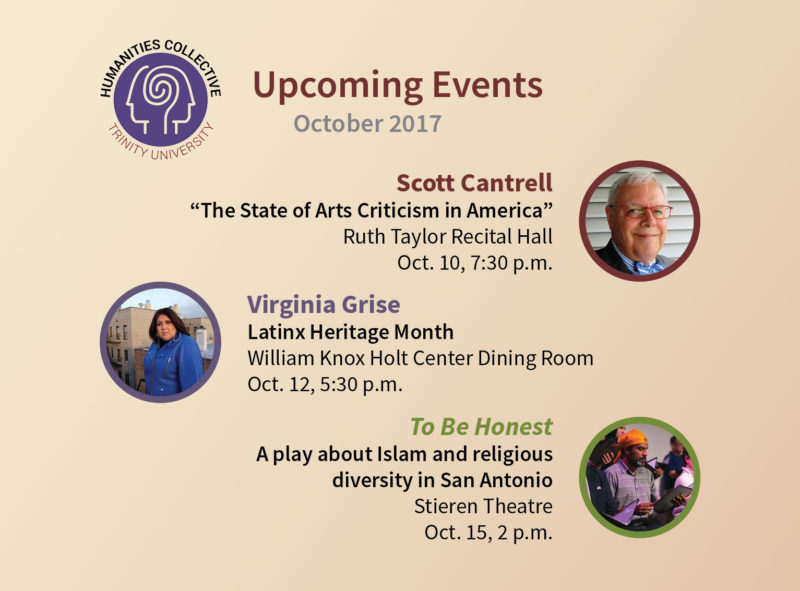In the spring of last year, faculty members from various humanities disciplines got together and created the Humanities Collective. The Collective was created as an attempt to highlight and promote events and lectures surrounding the humanities within Trinity and the larger San Antonio community. A combination of interdisciplinary learning, a national trend of skepticism toward the arts and a need for one place to house the humanities and its merits led to this organization being formed.
“The Collective came together in an attempt to think more broadly about the role of the humanities at Trinity,” said Tim O’Sullivan, chair of the classical studies department and co-president of the Collective. “We all enjoy the work we do in our individual departments, but we also get great value from talking with our colleagues in related disciplines. A few of us from various humanities departments regularly met to brainstorm about larger projects that would benefit from coordination between humanities departments. Eventually we made a proposal to the administration to make the arrangement somewhat more formal, and they agreed to do so, and the Humanities Collective was born.”
A great example of collaboration on Trinity’s campus is the Center for the Sciences and Innovation (CSI) and its success in encouraging interdisciplinary learning. Consequently, this structuring served as inspiration for the Humanities Collective.
“The Humanities Collective was conceived of as an analogue to CSI,” said Claudia Stokes, professor and chair of the English department. “So, CSI provides an opportunity for science departments to collaborate. They share lab spaces, they share staff and their students are able to easily move among science disciplines. So, we wanted to create a similar structure that would create opportunities for humanities faculty and students to collaborate.”
Another large contributor to the formation of the Humanities Collective was the budding emphasis being placed on the STEM fields and their importance. In turn, humanities began to be viewed with skepticism and as lesser fields, especially when compared to science and mathematics.
“Following 2008 and the great recession, university enrollment began to change,” Stokes said. “Nationally, from Obama, we saw a national push to promote science. That, in tandem with a growing economic anxiety, contributed to widespread national skepticism about the value of humanities and the liberal arts. Originally, faculty began talking about ways in which we could promote the humanities to Trinity students and to parents of prospective students.”
A part of the mission of the Humanities Collective is to unify the existing humanities programming. The aim is to put an umbrella over the research, lectures and other events surrounding the humanities and encouraging campus-wide engagement with these fields. The Collective often promotes these events through their Twitter and Facebook.
“We really want to highlight all of the great things that the humanities are doing on campus,” said Ruben Dupertuis, professor of religion and co-president of the Humanities Collective. “For example, we have the Lennox Lectures, which is bringing in a lot of great scholars. We also have the Stieren Arts Series. We have several different research programs and it’s just a great way to highlight all of these amazing things we’re doing.”
On campus, they have assisted in coordinating the Lennox Lecture Series, the Mellon Research Initiative and events for faculty and staff to engage with one another.
“One of my favorite events so far was a series of lunchtime conversations we hosted last spring where faculty from different arts and humanities departments got together and discussed their current research and pedagogical projects in an informal setting,” O’Sullivan said. “It was really quite inspiring to see how many different exciting things my colleagues are up to.”
On Nov. 28, the Collective is bringing in Daniel Mendelsohn, a renowned classicist and author from Bard College, who will be highlighting the importance of the humanities and the role they play in today’s society. He writes for The New Yorker and is an intellectual in the public sphere.
DC
GF – needs graphic







